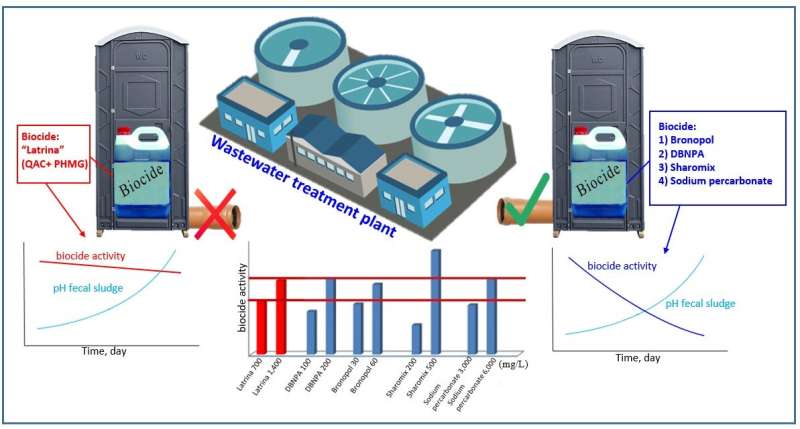Biologists compare and select most effective and nontoxic biocides for mobile toilets and dump wells

In agriculture, country houses and many other places without central sewerage, people use mobile toilets or dump wells. To prevent the foul smell in the bench-holes and during transportation of the contents to wastewater treatment facilities, biocides are added, which are chemical compounds that stop the activity of microorganisms.
However, biocides can harm the environment and hinder the work of wastewater treatment facilities. Toxic biocides can also make waste unsuitable for further use as biofertilizers and biofuel production. Russian scientists have proposed the solution to this problem in the journal Biology.
In Russia, about 22.6% of citizens live without central sewerage (according to Rosstat of 2019). In rural areas, this figure rises to 66.5%. Vacuum trucks pump out waste from dump wells and mobile toilets and take it to wastewater treatment facilities. Biocides, such as quaternary ammonium compounds and biguanide derivatives, help prevent the activity of odor-causing microorganisms during storage and transport of waste.
Biocidal agents based on these compounds—for example, Latrina—are very effective, but make the waste toxic because they decompose very slowly. Thus, they can harm the environment and kill microorganisms in wastewater treatment facilities. Scientists of the Russian Academy of Sciences compared various popular biocides and selected among the most effective ones, which are those that decompose into non-toxic components soon after they have fulfilled their function.
“In dump wells and mobile toilets, urea decomposes slowly, emitting ammonium, which makes the environment alkaline—its pH can grow up to 9–10. Biocides that decompose in an alkaline environment help to accomplish two goals at once: at first, they lower the activity of harmful bacteria, then break up and thus don’t harm the environment. We checked the results after 10 days—the period that is needed, for example, for full admission of toilets on main-line trains,” says Yuriy Litti, Ph.D, of the Russian Academy of Sciences.
Scientists selected six biocides that have no smell, are non-toxic in the used concentration and decompose when pH exceeds 7. Together with his colleagues, Yuriy Litti tested the effect of these biocides on the microorganisms, and also checked how well these agents decompose in the presence of alkaline during 10 days.
From six often-used biocides, four turned out to be more environmentally sound: Bronopol (30 mgl), Sharomix (500 mg/l), sodium percarbonate (6 g/l), and the biocidal agent on the base of 2,2 -dibro-3-nitrilopropionamide (500mg/l). Whereas popular biocidal agents like, for example, Latrina, remain for a long time in the environment and do not decompose. Silver citrate and sodium salt of dehydroacetic acid were excluded from the experiment, although they also decompose rapidly in the alkaline environment. They were required in too high a dosage, so the scientists decided that, given the high cost, these options are very expensive for consumers.
“In an alkaline environment, when pH reached 9, the minimal concentration of Bronopol , Sharomix ,and 2,2 -dibro-3-nitrilopropionamide necessary for stopping the growth of harmful microorganisms, increased by 1.5 to four times. It’s useful for our purposes, because by decomposition of urea during its transportation, pH only grows. In the future we plan to study in more detail how selected biocides work not only in the laboratory, but in real conditions. If successful, vacuum cleaners will know which products work best and cause less damage to the environment,” said Yuriy Litti.
More information:
Nataliya Loiko et al, Biocides with Controlled Degradation for Environmentally Friendly and Cost-Effective Fecal Sludge Management, Biology (2022). DOI: 10.3390/biology12010045
Provided by
Russian Foundation for Basic Research
Citation:
Biologists compare and select most effective and nontoxic biocides for mobile toilets and dump wells (2023, April 26)
retrieved 26 April 2023
from https://phys.org/news/2023-04-biologists-effective-nontoxic-biocides-mobile.html
This document is subject to copyright. Apart from any fair dealing for the purpose of private study or research, no
part may be reproduced without the written permission. The content is provided for information purposes only.
For all the latest Science News Click Here
For the latest news and updates, follow us on Google News.

